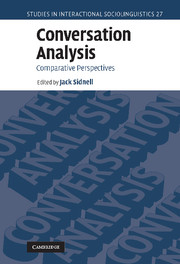Book contents
- Frontmatter
- Contents
- List of figures
- List of tables
- List of contributors
- Transcription conventions
- Part I Introduction
- Part II Repair and beyond
- Part III Aspects of response
- Part IV Action formation and sequencing
- Part V Conclusion
- 12 One perspective on Conversation Analysis: Comparative Perspectives
- Bibliography
- Index
12 - One perspective on Conversation Analysis: Comparative Perspectives
Published online by Cambridge University Press: 15 December 2009
- Frontmatter
- Contents
- List of figures
- List of tables
- List of contributors
- Transcription conventions
- Part I Introduction
- Part II Repair and beyond
- Part III Aspects of response
- Part IV Action formation and sequencing
- Part V Conclusion
- 12 One perspective on Conversation Analysis: Comparative Perspectives
- Bibliography
- Index
Summary
Preamble
The title of this book is Conversation Analysis: Comparative Perspectives, a title which appears to offer a well-defined promissory note about the nature of its contents. And so it does. There is an introduction which sets out some central characteristics of conversation-analytic (CA) work, and briefly reviews the history of comparative analysis in anthropology – together with some of the problems confronted in the course of that history. A number of the substantive chapters that follow report work that is comparative in its very nature; most of the authors of chapters in which this is not the case go out of their way to set their respective topics in comparative context – either by including data from other language/culture settings or by reviewing (some of) the literature which sets their work in a comparative framework. For a readership that is (I suspect) largely drawn from the so-called “social” or “human” sciences – anthropology, linguistics and applied linguistics, communication, psycholinguistics and cognitive science, social psychology, and sociology, this is what one would expect such a volume to provide … from its sub-title.
But its main title should make relevant as well other dimensions of comparison than the linguistic and cultural ones, and, before settling down to address what is actually in this book, I would like to use my bully pulpit to call to mind other “comparative perspectives” that ought to figure importantly in CA work, or at least be taken into account, even when they do not figure centrally. Like what?
- Type
- Chapter
- Information
- Conversation AnalysisComparative Perspectives, pp. 357 - 406Publisher: Cambridge University PressPrint publication year: 2009
- 61
- Cited by



